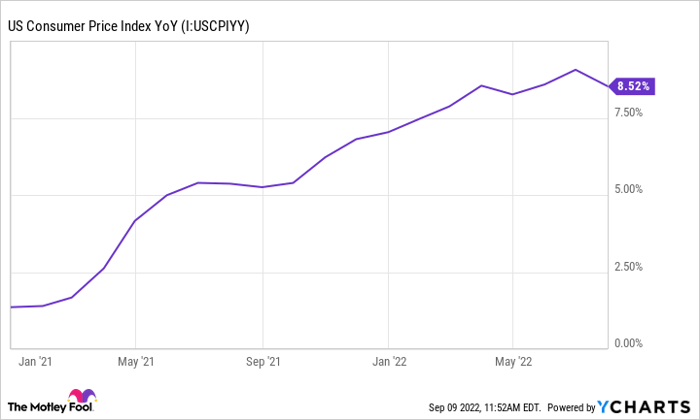This article was originally published on Fool.com. All figures quoted in US dollars unless otherwise stated.
The stock market has been a fickle place in 2022, with investor sentiment constantly changing by the day, week, and month. Inflation, which has been hovering near a 40-year high, has become the center of attention, as the market tries to figure out how high inflation might go and when it may peak.
The elevated inflation indicators over the past year or so are the main reason the Federal Reserve has had to raise interest rates so intensely this year, which has roiled markets and led to the worst first half of a year for stocks in about five decades.
On Tuesday, the US Bureau of Labor Statistics will release more inflation data -- in this case, the change in prices for the month of August -- which could have a big effect on the stock market. Let me explain.
More evidence to help guide actions
A major way that investors, economists, and policymakers measure inflation is through the Consumer Price Index (CPI), which tracks the prices on a basket of daily consumer goods and services. This figure indicates how much change occurs in the price year over year. The CPI has really shot up this year.

US Consumer Price Index YoY data by YCharts
In June (released in mid-July), the CPI clocked in 9.1% higher than one year prior, spooking investors and making them wonder just how aggressive the Fed might have to be with rate hikes to bring down inflation. But in July (released in mid-August), the market got some reprieve when the CPI came in about 8.5% higher on a year-over-year basis and remained unchanged from June on a monthly basis. The decline was led by a big drop-off in energy and gasoline prices, which have been surging all year long.
Stocks rallied after the July report on the belief that inflation might have peaked, but since that report, there have been a number of comments from the Fed and conflicting data points that have created a topsy-turvy market. The Fed is still currently on track to raise its benchmark overnight lending rate by 0.75 percentage points at its meeting later this month, in what would be its third such accelerated move in a row.
Now, the big question is: could August CPI data released on Tuesday provide further evidence that inflation has peaked and is now headed downward, or will it throw a wrinkle in the market and shoot higher?
Most economists seem to think that the data will be favorable. In a recent research note, economists at Morgan Stanley said they think the headline inflation number will drop and come in at 7.9% higher in August on a year-over-year basis, which would be a strong improvement. That drop is expected to once again be led by a decline in energy prices.
But less favorably, Morgan Stanley also predicted that rent prices would remain "strongly elevated for some time". Rent is typically a big part of a consumer's monthly expenses and therefore can cause inflation to linger.
There are also other encouraging signs that consumer prices are dropping. Consider, for instance, that wholesale used car prices fell in August, as did airline tickets and global food prices.
How the report could move the market
I'm expecting a lower CPI reading in August to move stocks higher, generally, as it would offer investors more proof that inflation is indeed declining and that the Fed may be able to pivot from its aggressive rate-hiking policies sooner than anticipated. But what happens if the headline CPI number jumps and comes in more than 8.5% higher? Well, then I would duck and find cover because it likely means that inflation is more persistent than the market could have imagined.
However, with CPI estimates already around 7.9%, that may curb expectations and any potential market move. Below that number might be perceived as positive, while above it may be perceived as a negative for the market.
Ultimately, I would never advise investors to try to play a near-term event like this, because it can be difficult to know how exactly the market will interpret certain data. For instance, if the CPI reading comes in woefully short of estimates, while it may seem like it would be a good thing, that could spook the market into worrying about a sudden drop-off in consumer demand and savings, which could hint that a more severe recession is lurking.
My advice would be to simply be aware that there could be significant movement on Tuesday, up or down. Don't panic, and continue to invest in stocks with good long-term prospects and strong fundamentals.
This article was originally published on Fool.com. All figures quoted in US dollars unless otherwise stated.









